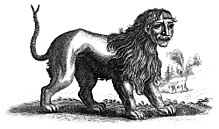manticore
Appearance
English
[edit]
Etymology
[edit]From Latin mantichōras, from Ancient Greek μαρτιχόρας (martikhóras, “man-eater; tiger”), from Old Persian *martyahvārah (“man-eater”), from 𐎶𐎼𐎫𐎡𐎹 (m-r-t-i-y /martyaʰ/, “man”).
Pronunciation
[edit]Noun
[edit]manticore (plural manticores)
- (Greek mythology) A beast with the body of a lion (usually red), the tail of a scorpion, and the head/face of a man with a mouth filled with multiple rows of sharp teeth (like a shark), said to be able to shoot spikes from its tail or mane to paralyse prey. It may be horned, winged, or both; its voice is described as a mixture of pipes and trumpets.
- 2005, “Circus Maximus”, performed by Clutch:
- Now may I present to you the basilisk?
Please down your goggles if you wish to resist
From the fiery depths of the planet’s core
The never sleeping for want of eating unholy stench of the manticore
Translations
[edit]mythical creature
|
Further reading
[edit]- Douglas Harper (2001–2025) “manticore”, in Online Etymology Dictionary.
Anagrams
[edit]French
[edit]Pronunciation
[edit]Noun
[edit]manticore f (plural manticores)
Categories:
- English terms derived from Latin
- English terms derived from Ancient Greek
- English terms derived from Old Persian
- English 3-syllable words
- English terms with IPA pronunciation
- English lemmas
- English nouns
- English countable nouns
- en:Greek mythology
- English terms with quotations
- en:Mythological creatures
- French 3-syllable words
- French terms with IPA pronunciation
- French terms with audio pronunciation
- French lemmas
- French nouns
- French countable nouns
- French feminine nouns
- fr:Mythological creatures

